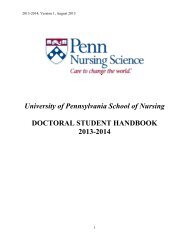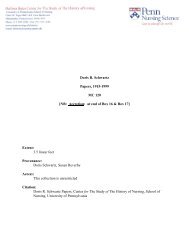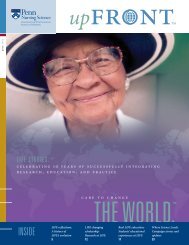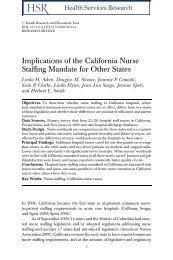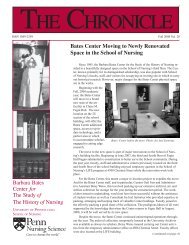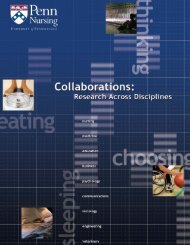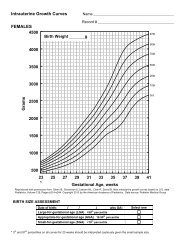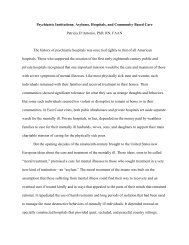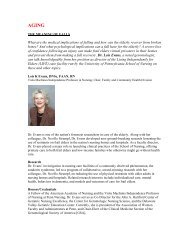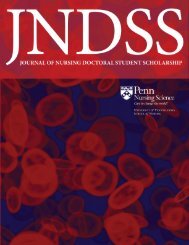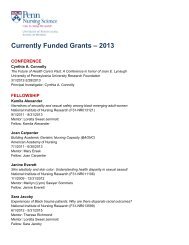Research Centers - University of Pennsylvania School of Nursing
Research Centers - University of Pennsylvania School of Nursing
Research Centers - University of Pennsylvania School of Nursing
Create successful ePaper yourself
Turn your PDF publications into a flip-book with our unique Google optimized e-Paper software.
AT HOME<br />
Mr. Jackson and Mr. Jones are both 65 year<br />
old Philadelphians. They share a love <strong>of</strong> their<br />
communities, their hometown sports teams,<br />
card games, and a diagnosis <strong>of</strong> type 2<br />
diabetes. Despite these similarities, there is<br />
one life-threatening difference — Mr. Jones<br />
is more likely to die from complications<br />
caused by his diabetes than Mr. Jackson<br />
simply because Mr. Jones is African<br />
American and Mr. Jackson is Caucasian.<br />
Both here and abroad, some are<br />
suffering from complications <strong>of</strong> manageable<br />
diseases because they lack access to care and<br />
education. The <strong>School</strong> <strong>of</strong> <strong>Nursing</strong>’s Center for<br />
Health Disparities <strong>Research</strong> (CHDR) is working<br />
to close the gap in disease diagnosis and<br />
access to appropriate care.<br />
“Despite steady improvements in<br />
the overall health <strong>of</strong> the U.S. population,<br />
disparities still exist,” says Loretta Sweet<br />
Jemmott, GNu ’82, GR ’87, HOM ’95, PhD,<br />
RN, FAAN, the van Ameringen Pr<strong>of</strong>essor<br />
in Psychiatric Mental Health <strong>Nursing</strong> and<br />
CHDR Director. “Racial and ethnic minorities<br />
receive a lower quality <strong>of</strong> healthcare and<br />
have higher rates <strong>of</strong> morbidity and mortality<br />
than non-minorities, even when accessrelated<br />
factors, such as insurance status and<br />
income are controlled,” says Dr. Jemmott,<br />
indicating the life expectancy for African<br />
Americans is approximately five years<br />
shorter than Caucasians.<br />
According to Dr. Jemmott, issues<br />
that contribute to health disparities<br />
include personal behavior and lifestyle,<br />
socioeconomic status, cultural and religious<br />
backgrounds, education level, racism,<br />
discrimination, bias, and marginalization.<br />
In Philadelphia, the Center has established<br />
relationships with public and private<br />
schools, healthcare clinics and providers,<br />
the Philadelphia Departments <strong>of</strong> Health<br />
and Housing, the Hospital <strong>of</strong> the <strong>University</strong><br />
<strong>of</strong> <strong>Pennsylvania</strong>, The Children’s Hospital <strong>of</strong><br />
Philadelphia, and local community advisory<br />
boards. “In order to be successful with these<br />
groups, it is important to understand the<br />
various cultural issues and traditions that<br />
impact health-related behaviors and tailor<br />
the evidenced-based program accordingly,”<br />
says Dr. Jemmott.<br />
Also conducting research in a cultural<br />
context, Assistant Pr<strong>of</strong>essor <strong>of</strong> <strong>Nursing</strong><br />
Lisa M. Lewis, PhD, RN, is working in<br />
West Philadelphia to determine the impact<br />
spirituality has on hypertension care and<br />
control in the African American community.<br />
“Cardiovascular disease is the number<br />
one cause <strong>of</strong> death for African Americans<br />
and the prevalence <strong>of</strong> hypertension in that<br />
community is more than 40 percent,” says<br />
Dr. Lewis. “Unfortunately, many African<br />
Americans <strong>of</strong>ten do not seek healthcare<br />
because they do not trust providers or may<br />
have had negative experiences in the past.<br />
We have to bring healthcare to them, in<br />
places where they are comfortable.” While<br />
patients have reported they pray for doctors<br />
and nurses, Dr. Lewis has also discovered<br />
Cultivating<br />
the Next Generation<br />
<strong>of</strong> Scientists<br />
Roberta L. Waite, EdD, MSN,<br />
APRN, a postdoctoral research<br />
fellow in the CHDR, investigates<br />
depression in women who are<br />
HIV positive and Adult Attention<br />
Deficit Hyperactivity Disorder<br />
among ethnic minority populations,<br />
particularly African American<br />
women. “The Center has been<br />
instrumental to my research and<br />
scholarship endeavors in developing<br />
my writing for peer-reviewed<br />
journals and in developing proposals<br />
for grants,” she says. “The Center has<br />
also been helpful in supporting my<br />
connection with colleagues having<br />
similar research interests. These<br />
relationships will continue after the<br />
completion <strong>of</strong> my fellowship.”<br />
september 2007 | 17





